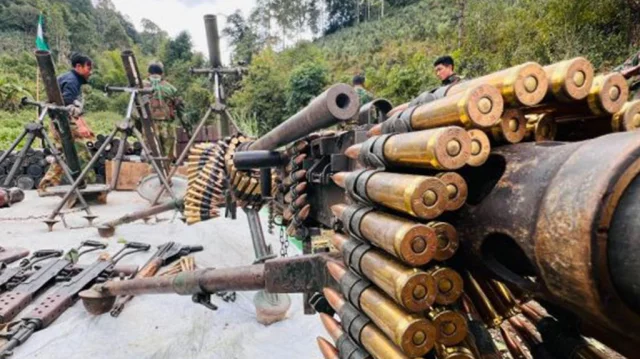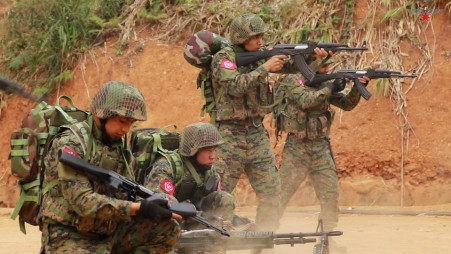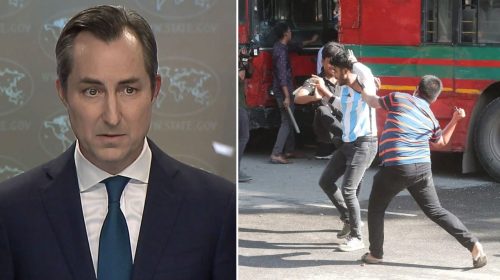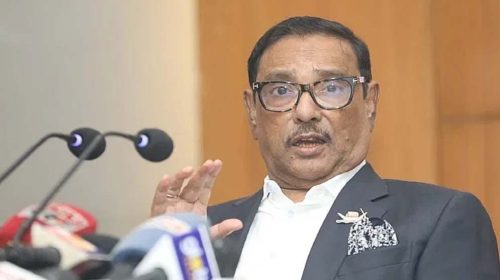The conflict between Myanmar’s Junta government and rebels in Rakhine state has spilled over into Bangladesh, with over 300 junta forces seeking refuge there. The recent death of a Bangladeshi citizen enear the border has raised security concerns. As a result, finding a lasting solution to the Rohingya crisis with Myanmar is becoming increasingly uncertain. Bangladesh is now seeking solutions with neighboring countries like India and China.
Many individuals believe that the situation in Bangladesh is becoming increasingly intricate as a result of the civil war in Myanmar, the renewed conflict in Rakhine, and the ongoing Rohingya crisis. Simultaneously, the diplomatic challenge of resolving the crisis with Myanmar has intensified due to geopolitics and the conflicting interests of superpowers in the region.
At this moment, Bangladesh is facing a severe crisis with around more than 1 million Rohingya refugees as a government responsibility. Ensuring the welfare of the Rohingya population in Bangladesh should be prioritized, just as China and India have prioritized their economic and strategic interests in Rakhine. The resolution of the Rohingya issue remains uncertain due to the ongoing conflicts in Rakhine and Myanmar.
Analysis of national security experts suggests that the situation surrounding the Rohingya is heading towards a crisis even from a geopolitical perspective. They argue that somewhat invisibly, imperceptibly, within the realm of international politics, the Rohingya are gradually transforming into a focal point of geopolitics. This issue has now become more complex for Bangladesh. Because our goal for so long was to repatriate the Rohingya, but now resettlement poses a complete risk. No one is talking about resettlement now. The big challenge for Bangladesh here is to stabilize the Rohingya. Although it is an internal matter for them, since we are affected, we are also being attacked. The problem of cultivation in our border region persists.
If we analyze the Rohingya issue in depth, it becomes evident that China has the highest economic and strategic interests in Myanmar. China is constructing major gas pipelines, electricity projects, and a deep-sea port in Rakhine. India has also invested in the region for its own interests. According to security analyst Emadadul Haque, China has established a seaport in Kyaukpyu in Rakhine state. From there, they have built two pipelines connecting to the Chinese mainland, one for gas and the other for oil. This arrangement allows them to import fuel from the Middle East through this route up to Kunming.
On the other hand, the Rohingya state has become crucial for India in terms of strategic interests. India has bypassed Bangladesh to connect Sitwe, which is the former Akyab port, with Kolkata through waterways suitable for ship transportation. From Akyab, the Kaladan project is creating a connection with Mizoram in northeastern India through roadways. This project will provide an alternative road communication facility in the northeastern region. In Rakine, India’s project is called the Kaladan Multimodal Transit Transport Project. The objective of this project is to establish a multi-model transportation system for the transportation of goods through waterways and roadways.
It is evident that Bangladesh is actively pursuing a diplomatic solution to the crisis in Myanmar and the Rohingya issue. Bangladesh is maintaining communication with Myanmar’s trusted and participating countries on a multilateral level. In this regard, Bangladesh aims to keep China and India, two neighboring countries, by its side. Recently, after completing his first bilateral visit to India, the Foreign Minister of Bangladesh briefed the Indian National Security Advisor and other important personalities on the Myanmar issue and discussed it in details. The Minister also mentioned that the two countries will work together and emphasize the unity on this matter.
On the other hand, another important minister of the government and the general secretary of Awami League, Obaidul Quader, has expressed his desire for China’s support in resolving the Myanmar crisis. However, there are doubts about how effective India’s strategy will be in resolving the Myanmar issue, as it depends on China. It is said that India’s and China’s role in the Rohingya issue has not shown a viable path for effective resolution in favor of Bangladesh. This is why even in 2017, a Rohingya could not be sent back. Former Foreign Secretary of Bangladesh, Touhid Hossain, believes that “establishing communication with ENI and Arakan Army is necessary at our non-governmental level. The government may not be able to accept that. But this incident is happening in the world. What are the Chinese saying, they are supporting the Arakan Army.”

Mr. Hossain says, “Many people here may think that it may not be favored by India or China. However, everything will not be according to the preferences of either India or China. According to our preferences, they have not taken any steps to repatriate the Rohingyas. Therefore, we need to take some measures so that the path for the return of the Rohingyas can be opened, even if it is to a small extent.”
The groups fighting from Shan State to Arakan in Myanmar are mostly supported by China. They have relations with the military and the rebel groups. Many people believe that there is also a good relationship between China and the rebel Arakan Army in Rakhine.
However, there is another group in Myanmar that opposes the government, which is the NUG or National Unity Government. They are a pro-China party. After being ousted from power, NUG mainly relies on the Western or American support.
China’s economic evaluation is influenced by the West, and if they are allowed to increase, China’s interests may be compromised here. Because the newly elected President of the UN has recently stated in an interview that they will not have any unilateral policies. China has received their message from here as well. Since the military is losing popularity, whoever is powerful should be controlled by China, that’s why China is supporting them as well, according to analyst Emdadul Islam.
“India does not show any intention of interfering in China’s economy, and if China does not create any obstacles in India’s geostrategic interests, then there will be a matter of mutual relationship. Perhaps Bangladesh can do that. It has to be done in a very sophisticated way. That’s diplomacy.”
According to analysts, China has had the most influence on both the Myanmar government and the rebel groups in Rakhine so far.
Recently, Bangladesh has managed to send back over three hundred members of the government forces who had sought refuge in Bangladesh.
In addition to swiftly repatriating members of the government forces, Bangladesh has also strengthened border security to ensure that the Rohingya cannot enter the country.
In the issue of Myanmar, the highest priority for Bangladesh is the repatriation of the Rohingya. And in this regard, the success achieved is seen as the biggest challenge for Bangladesh’s diplomacy.





















